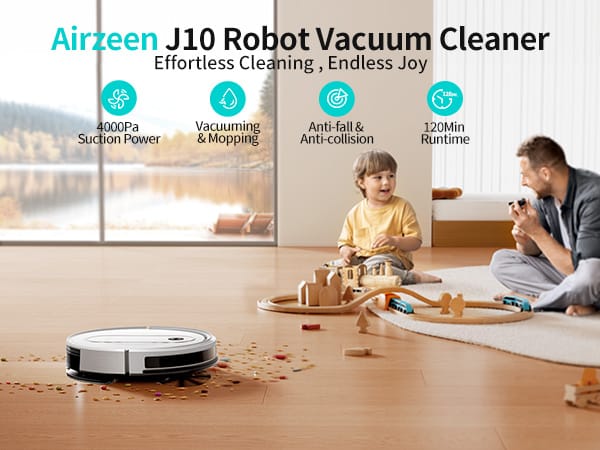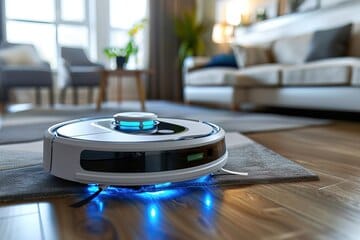Robot Vacuum More clean: Altering Home Cleaning
Robot vacuum cleaners have changed the manner in which individuals approach family cleaning. By consolidating trend setting innovation with comfort, these gadgets mechanize perhaps of the most tedious task, permitting clients to appreciate cleaner homes with negligible exertion. This article investigates the plan, elements, advantages, and difficulties of robot vacuum cleaners, as well as their future potential in upsetting home cleaning.

- What is a Robot Vacuum Cleaner?
A robot vacuum cleaner is an independent cleaning gadget that utilizes sensors, engines, and man-made brainpower (simulated intelligence) to explore and clean floors without human intercession. Intended to perform errands, for example, vacuuming residue, soil, and trash from different surfaces, these gadgets are minimal, programmable, and equipped for adjusting to various home conditions.
Key Features
Minimized and low-profile plan for exploring restricted spaces.
Independent activity utilizing sensors and calculations.
Similarity with different floor types, including hardwood, tiles, and covers.
High level functionalities like cleaning, self-purging containers, and voice control.
- Components and Design of a Robot Vacuum Cleaner
Robot vacuum cleaners are outfitted with cutting edge equipment and programming that permit them to proficiently perfect. The following are the essential parts:
a. Body Structure
Round or D-Shape Plan: Most robots have a conservative, roundabout shape, while others include a D-shape for better edge cleaning.
Low Level: Permits the vacuum to clean under furnishings and other low-freedom regions.
b. Sensors
Hindrance Discovery Sensors: Forestall crashes with furniture or walls.
Cliff Sensors : Recognize steps and keep the robot from falling.

Soil Location Sensors: Spotlight cleaning endeavors on intensely dirtied regions.
Planning Sensors: Use cameras or LiDAR to make a guide of the home for productive route.
c. Cleaning Mechanisms
Brushes and Rollers: Clear soil into the pull way.
Pull Engine: Eliminates soil and trash from surfaces.
HEPA Channels: Trap fine particles, further developing air quality.
d. Navigation and Control
Route Framework: Uses computer based intelligence calculations for effective cleaning ways.
Control Connection point: Worked through portable applications, controllers, or voice collaborators like Alexa and Google Right hand.
- Features and Functions of Robot Vacuum Cleaners
A . Intelligent Navigation
Current robot vacuums utilize trend setting innovations like laser planning, gyroscopic route, and man-made intelligence to diagram the most effective cleaning courses. This forestalls monotonous cleaning and guarantees total inclusion.

Multi-Surface Cleaning
Robot vacuum cleaners can flawlessly progress between surfaces, changing their pull ability to clean covers, hardwood floors, tiles, and mats successfully.
c. Scheduled Cleaning
Clients can program cleaning plans through portable applications, empowering the robot to clean at explicit times, in any event, when they’re not home.
d. Smart Home Integration
Numerous robot vacuums are viable with brilliant home environments, permitting clients to control them utilizing voice orders or incorporate them with other shrewd gadgets.

e. Automatic Charging
At the point when the battery runs short, the robot naturally gets back to its charging dock. A few models continue cleaning subsequent to re-energizing.
f. Advanced Features
Self-Exhausting Canisters: Consequently store gathered flotsam and jetsam into a bigger receptacle.
Mopping Functionality : Joins vacuuming with wet cleaning for a more profound clean.
Zone Cleaning: Permits clients to determine regions to clean or stay away from.
- Benefits of Robot Vacuum Cleaners
a.Time-Saving
Robot vacuums work independently, saving time for clients to zero in on different errands or unwind.
b. Convenience
With highlights like planned cleaning and application based control, robot vacuums give unmatched accommodation.
c. Improved Accessibility
Their reduced plan permits them to clean regions that are challenging to reach with customary vacuum cleaners, like under furnishings or sharp corners.
d. Consistent Cleaning
With programmable timetables, robot vacuums guarantee standard cleaning, keeping homes reliably clean.
e. Allergy Relief
Furnished with HEPA channels, these gadgets trap allergens like residue parasites and pet dander, further developing indoor air quality for sensitivity victims.

f. Energy Efficiency
Robot vacuums consume less energy than conventional vacuum cleaners, making them an eco-accommodating choice.
- Challenges and Limitations
In spite of their many benefits, robot vacuum cleaners have specific constraints:
a. Initial Cost
Top of the line models with cutting edge elements can be costly, making them less open to economical buyers.
b. Limited Cleaning Power
While successful for light cleaning, robot vacuums may not match the attractions force of conventional vacuum cleaners, especially for profound cleaning undertakings.
c. Maintenance
Robot vacuums require ordinary support, like cleaning brushes, channels, and sensors, to keep up with ideal execution.
d. Navigation Issues
In jumbled spaces, robots might battle to explore productively, prompting fragmented cleaning.
e. Battery Life
Albeit most models can clean medium-sized homes on a solitary charge, bigger spaces might require various cleaning cycles.
f.Noise Levels
A few models can be uproarious, which might upset inhabitants during activity.
- Applications of Robot Vacuum Cleaners
Robot vacuum cleaners are appropriate for different conditions:
a. Residential Cleaning
They are great for homes with occupied plans, animal people, and families with little youngsters.
b. Office Spaces
In workplaces, robot vacuums give effective cleaning during non-working hours, keeping spaces clean without upsetting representatives.
c. Hospitality Industry
Lodgings and cafés use robot vacuums to keep up with tidiness, particularly in high-traffic regions.
d. Healthcare Facilities
In medical clinics and facilities, robot vacuums add to keeping up with cleanliness by eliminating residue and flotsam and jetsam consistently.

- Innovations and Future Developments
The robot vacuum cleaner market keeps on developing, with producers acquainting new advances with upgrade execution and client experience.
a. AI-Powered Cleaning
Future models will include further developed simulated intelligence calculations for more intelligent route, ongoing snag discovery, and better transformation to client inclinations.
b. Enhanced Mapping Technology
Progressions in planning innovation, for example, 3D planning and expanded reality, will empower robots to explore more mind boggling conditions with more prominent exactness.
c. Voice and Gesture Control
Voice orders and motion acknowledgment will turn out to be more refined, offering clients consistent collaboration with their gadgets.
d. Eco-Friendly Designs
Makers are chipping away at making energy-effective models with recyclable parts to diminish ecological effect.
e.Multi-Functionality
Future robots might consolidate vacuuming, wiping, air decontamination, and, surprisingly, home security functionalities into a solitary gadget.
f. Lower Costs
As innovation turns out to be more reasonable, robot vacuum cleaners will become open to a more extensive crowd.
- Popular Robot Vacuum Cleaner Brands
a. iRobot Roomba
Known for its high level route frameworks and unwavering quality, Roomba offers a scope of models reasonable for various financial plans and cleaning needs.
b. Roborock
Consolidating vacuuming and wiping capacities, Roborock is a well known decision for mortgage holders looking for multi-usefulness.
c. Dyson 360
Dyson’s top of the line models gloat strong attractions and high level artificial intelligence highlights, taking care of premium clients.
d. Ecovacs Deept
Offering astounding incentive for cash, Debit models incorporate highlights like application control, planning, and wiping.
e. Shark IQ Robot
Shark’s self-purging models are known for their benefit and productivity.
- Buying Guide for Robot Vacuum Cleaners
While buying a robot vacuum cleaner, think about the accompanying variables:

a.Budget
Decide your financial plan and pick a model that adjusts highlights and reasonableness.
b. Cleaning Needs
Survey your home’s cleaning prerequisites, like the presence of pets, covered regions, or high-traffic zones.
c. Navigation System
Search for models with cutting edge planning and obstruction discovery capacities for productive cleaning.
d. Battery Life
Guarantee the robot can clean your home on a solitary charge, or settle on a model with auto-re-energize and continue usefulness.
e. Maintenance
Pick a model with simple to-clean parts and enduring parts.
f.Smart Features
For accommodation, consider robots with application control, voice orders, and shrewd home similarity.
Conclusion
Robot vacuum cleaners have altered home cleaning by offering a productive, advantageous, and inventive answer for keeping up with tidiness. While they are not without constraints, their advantages far offset their disadvantages, making them a fundamental expansion to current families. As innovation keeps on propelling, robot vacuums are set to turn out to be significantly more canny, flexible, and open, making ready for a future where cleaning is completely mechanized.